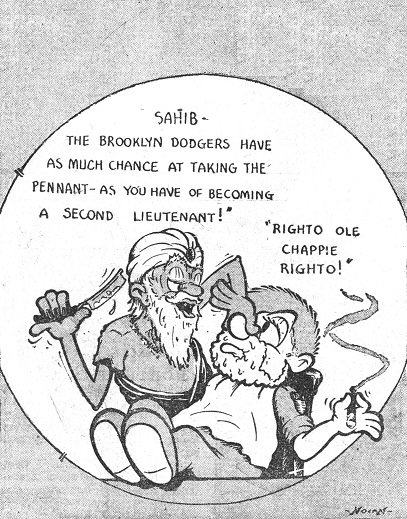
VOL. I NO. 35 REG. NO. L5015 DELHI, THURSDAY MAY 13, 1943.
RECORD-BREAKING CARGO PLANE TRIP
REACHES DESTINATION AT INDIA BASE
Strikes Hard At Jap Bases CHUNGKING - Three recent 14th Air Force operations against the Jap were eminently successful, with a toll of 28 planes being taken and enemy installations undergoing a hard pounding. B-24's, B-25's and P-40's attacked the Tien Ho and White Cloud air bases at Canton Saturday. These installations are important training, assembly and staging points for Japanese air activities in China, Indo-China and the Southwest Pacific. Striking their objectives in waves, heavy and medium bombers dropped over 40 tons of bombs with complete accuracy. Hits were scored upon dispersal areas, hangars, fuel storage dumps, repair shops, factories and runways, causing heavy damage. In addition, approximately six enemy aircraft were destroyed on the ground. A number of large fires were started, with the smoke from one visible over 100 miles from the target area. Anti-aircraft fire was heavy, but enemy interception was delayed, due to our planes reaching the objectives virtually undetected. INTERCEPTION SMASHED Following the bombing runs, a large formation of Zeros and I-97's attempted to intercept a flight of heavy bombers and were engaged by a P-40 escort. In a 15-minute running battle, our fighters destroyed 13 enemy planes, while gunners riding the B-24's confirmed three more. Five other aircraft were probably destroyed and two damaged. One medium bomber and crew were lost in this action. All other planes and personnel are reported safe. B-24's and B-25's, escorted by P-40's attacked the Hanoi-Haiphong area in Indo-China and Samah on the southern tip of Hainan Island on May 4. The mission was the heaviest bombing and strafing raid of the war against Jap installations from China-held bases until Saturday's raid. The bombers reached their targets without interception and against ineffective anti-aircraft fire. In the Hanoi-Haiphong area, it is estimated that 75 percent of the bomb tonnage struck target areas, destroying or heavily damaging fuel and ammunition dumps, warehouses, an oil refinery, coal yards and a dock installation. Many fires were observed. P-40'S ACTIVE At Samah, hits were scored upon airdrome, hangars, barracks and runways. P-40's strafed the target areas following the bombing operations and, on the return flight, destroyed two locomotives and strafed a supply train. Chinese pilots attached to several 14th Air Force units participated in the successful mission. All our planes are accounted for. Fighters intercepted a formation of approximately 30 Jap planes over Hunan Province on May 2. After thwarting the attempted attack on one of our bases, our P-40's forced the enemy into a running battle in which 14 of our pilots scored six confirmed victories and seven probables. One of our pilots was lost in this engagement. 10th Air Force Gives No Rest To Jap Bases Bomber and fighter planes of the 10th Air Force continued to pound enemy installations in Burma without cessation during the period of May 4-9. A thumbnail sketch: MAY 4 - Two formations of B-24's hurled 30 tons of explosives on Toungoo, one of which attacked Jap headquarters with all bombs "in the target area." MAY 5 - B-25's inflicted damage upon railroad installations at Myingyan, destroying the engine turn-table. Other B-25's hit warehouses and railroad installations at Alon. B-24's made sweeps against Prome and Pyinmana and struck heavy blows with 20 tons of bombs. P-40's engaged in strafing missions against Wawaung and Kamaing. MAY 6 - Two formations of B-24's attacked the Namtu mines, which the enemy have been repairing. The first scored hits on the flotation plant and concentration mill; the second struck at the smelter plant and a narrow gauge railroad. B-25's bombed railroad installations at Myohaung Junction. MAY 7 - B-25's
MAY 8 - B-24's struck at the Mahlwaggon railroad yards at Rangoon, destroyed the roundhouse and drove off enemy interceptors. A second formation attacked the Sinthe Railroad Bridge. B-25's destroyed a locomotive in the Natkayaing railroad yards and strafed three others. Other B-25's bombed the railroad yards at Kyaukse and probably destroyed three enemy fighter planes which intercepted. P-40's, carrying 1,000-pound bombs, crippled the Loilaw Railroad Bridge. MAY 9 - One formation of B-25's bombed Jap barracks at Maymyo, while another struck at the railroad yards at Yamethin. P-40's participated in widespread action. |
Only Four Days
In Mass Flight
By PEPPER MARTIN
United Press War Correspondent
INDIA AIR BASE - America's newest and largest twin-engined cargo planes completed a record-breaking hop halfway around the world, with crack American airline pilots participating in the longest and largest mass flight in transport history.
The flight completed the span from America to India in four and one-half days, while the entire group flew the distance without loss, bringing 90 tons of cargo nearly 15,000 miles. Ninety tons does not, however, represent a maximum load. The planes comprise concrete evidence of President Roosevelt's promise to provide more material so this Theater may deliver heavier blows to the Jap.
The Curtiss Co. loaned Lt. Col. W. C. Goldsborough, Dover, Del., (U.S. Army, retired), as project engineer to head the flight. Northwest Airlines TWA captains piloted the planes.
‘LIKE SHOOTING FISH’
Capt. D. C. Brown, Reno, Nev., who has flown 30 trans-Atlantic round trips, said, "The trip was like shooting fish in a rain barrel - just a day's work. Everybody is really sold on this ship, which is a real airplane."
The plane has tremendous freight capacity, while twin-engined Pratt-Whitney engines give it a high altitude ceiling. Auxiliary gas tanks installed for the flight were never used. This is the first overseas Theater where the plane appeared.
Capt. C. G. Fredericks, Washington, D.C., TWA pilot with 40 roundtrip trans-Atlantic flights to his credit, had only one hour flying time and three practice landings in the plane before the eastward hop started. Fredericks said, "We had only minor operational trouble. One captain tested an auxiliary tank in the mid-Atlantic and both engines quit. But they restarted when he switched back to the main tanks. The trip showed that the plane is the sturdiest combination of plane and engine we have run into yet."
THREE REASONS
Goldsborough said, "The successful trip was due to experienced pilots, damned good navigation and fine planes."
The planes carried enough supplies to operate a unit normally one year without additional equipment. At an American base in India, crews, combatting dust and heat, established their own messes and purchased food within 24 hours after their arrival. Next day, they began training Army pilots, who are veterans of this Theater.
CBI Pilot Ace
Meets Death
In Air Duel
CHINA AIR BASE - Capt. John Hampshire, 24, leading fighter ace of the CBI Theater, with 14 Jap planes to his credit, died here recently from injuries received during fighter action.
Hampshire went down swinging. Before he was hit during the scrap, he sent two Jap Zeros down in flames. He was able to land his plane in a river and was pulled out of the wreckage by Chinese boatmen who carried him to the office of the nearest magistrate. He died there from shock and loss of blood.
In four air fights in 32 days, Hampshire destroyed at least two Jap planes in each engagement. On his last trip with a group of P-40's that attacked a Jap formation, he nailed two confirmed Jap planes and probably four more. He said at the time, "We could navigate home by the fires of burning Jap ships."
The population of a whole town in the 14th Air Force area turned out to mourn the death of the legendary "Meigwo Fijisu" American fighter. Every Chinese brought flowers to decorate the ace's coffin. Hampshire was buried in a tomb reserved for American fighting men who have died in action. Hampshire came from Grants Pass, Ore., and would have been 25 on May 18.
Col. Bruce K. Holloway, fighter commander of the 14th Air Force, said, "Capt. Hampshire was a great flier. He was utterly fearless and an excellent flight leader. The 14th Air Force and his squadron will miss him in their future actions."
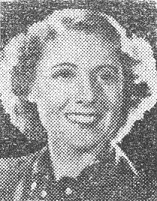
|
First Clare Luce Column For Roundup Readers
WASHINGTON - "Here the gavel fell" . . . At a meeting of the House Military Affairs Committee this morning, a member of the committee put the following question to witness Paul V. McNutt: "Is it true, as I have been told on reliable authority, that our 2,639,128 federal employees include almost 1,000,000 of draft age?" As War Manpower Commissioner, handsome Mr. McNutt is responsible for putting every able-bodied man in the United States not in essential industry or in a job essential to the war effort into uniform, he hesitated briefly before answering the question.
Anyone in Washington who understands the prime importance of keeping the party's political fronts manned, war or no war, understood the hesitation. He then answered smoothly, "I would like to know who your 'authority' is before I answer that one."
DIDN'T MATTER
Recently the New York Times conducted an inquiry among 7,000 college freshmen in State universities to find out what the younger generation knew about United States history, current and past, (Result deplorable). Among the questions put to the freshmen was one to name some dead woman who played a conscious part in getting the American women the right to vote in 1920. Over 75 percent of the freshmen couldn't recall one of the multitudinous deceased heroines responsible for this world-shaking event. But those who finally fished out some name from the subconscious mostly submitted the name of your correspondent.
No one realizes better than I that young people of the United States raised in the decade of the rubber stamp Congress naturally have seen nothing incongruous between being dead and being a member of Congress. But let me reassure you at once, dear readers, these reports of my death are greatly exaggerated. Let me also assure you whatever your Republican and Democratic Congressmen are today, they are not Zombies. So, fact one:
I am very much alive. Fact two: I am a member of Congress, Republican fourth District of Connecticut and a member of the House Military Affairs Committee.
You know or should know what I look like. For if your editor has done right by me, this column should include a picture recently taken, only retouched slightly. It will look, therefore, about three years younger than I really am. This is quite in tradition with columnists. Pictures that Ray Clapper, Walter Lippman, Westbrook Pegier use are ones used years ago, which even then made them look three years younger (Recently one of your colonels sent me a posed photo taken out there. I note even Army men prefer to be photographed on this retractive principle).
I have, by first marriage, one incredibly beautiful, clever daughter (This should put you on notice that I am given to strong personal prejudices and loyalties). My second husband is brilliant, bushy-browed, hard-working, crusading, balding Henry Robinson Luce, publisher and editor of magazines. He conceived Time, Life, Fortune and March of Time on the radio and screen. I don't write, edit or influence his magazines. So, don't send me your blasts about them; send them to the editor.
I am a writer by profession. I "batted out" (lovely American euphemism for blood, tears, toil, and sweat over the typewriter) the following books and plays: Stuffed Shirts, The Women, Kiss The Boys Goodbye, Margin For Error, Europe in Spring.
War and family exchequer permitting between 1912 and 1935, I visited as a tourist most of the countries of Europe every other year or so. I've spent unhappy years of wild inflation in postwar Germany as a girl student. After 1935 I went as a newspaper columnist to Europe and North Africa (I can still smell Tunis. You no doubt know connoisseurs' smells by this time but Tunis smelt pretty high even before Italians and Germans got there).
Early in 1940, I went as Life's correspondent, to England, Italy, France, Holland and Belgium to report on the "phoney" war and got caught in Belgium in the Blitz. I extricated myself nicely, thank you.
In the spring of 1941 I went to Chungking, China via Pan American clipper and returned to the United States in an uneasy frame of mind as you might expect and then decided the big blow was coming from that direction and was sure it would hit the Philippines.
|
So that summer I went there. I missed the show by a matter of weeks. In February, 1942, I enplaned to Chungking again, taking a long hop from Miami, Lagos, Calcutta and Burma. On the road to Mandalay in the Baptist mission in Mymyo, I encountered men of Stilwell. (Item: Mrs. Joseph Stilwell thinks the general looks thin. Everybody else in Washington notes the blood in his eye). There in Burma I also met particularly an energetic character, one, then Capt. Fred Eldridge, who, while Jap bombs were falling all around the mission, conceived the magnificent idea of the Roundup and I agreed to write a column for it.
But that was not true. At that time every American in Burma was too busy, wondering if he would live to read another copy of the Emporia Gazette or the New York Times to think about starting an overseas paper.
All began months later, when Capt. Eldridge sent me a copy of the CBI. My great enjoyment was somewhat marred by reading one of your columns which to my mind positively reeked with Democratic partisanship (Of course, as a Republican you understand I was not at all partisan). In it I noticed a very patronizing masculine reference to myself calculated to make loyal readers of the CBI believe, whereas I might be a physical adornment of our great American Congress, my mental equipment for the job left something to be wished for.
Now, dear overseas constituents, what "they say" about me in the American press leaves me quite calm. But when I found myself misrepresented to you, well, I set what one confused columnist called my "sharp, gentle angle of feminine yet strangely belligerent jaw" and said, "Just let me in that paper."
You see, I jealously cherished your high regard, because, in all seriousness, it's because of you I am in Congress. All I saw in Burma, China, India, Africa on that last trip - and incredibly swell the way you were taking it - made me decide if I couldn't (being a woman) join you in the toughest job in the world - fighting the way - I could take a whack at the next toughest (honestly), fighting the war in Congress. And that is the truth, and you must believe me.
In a special sense this column is written to try to pay off one citizen's eternal debt of gratitude to the men of Stilwell whom I saw so gallantly in action. It will appear nowhere except in the CBI. I knew, admired you - even in the days when a private was a rank of tremendous distinction in India. From Hell to breakfast across thousands of miles I salute you (Boy, one small chota peg for your new correspondent.) I believe in you - when you grouse and when you don't, when you fight and when (which is harder) you wait. All America does, too.
Well, so I came back home after the fall of Burma and in Fairfield Country campaigned against a New Deal rubber stamp. My platform was "hard war, not soft war." I got the job.
Last week my defeated opponent told the press ruefully that next time his tactics were going to be different, and said, "It doesn't pay to be a gentleman." Well, every candidate can't be a lady. Now I, down here in Washington, am in the greatest, finest legislative body in the world (See any on your travels you really prefer, fellows? Don't undersell your Congress is the motto of this column.)
Next week I would like to tell you what the 78th Congress has accomplished in the last four months in my opinion.
When on the floor of the House of representatives, a speaker has used up the allotted time, the "bossman" lifts his big wooden gavel and brings it down on the wooden block - I mean the inanimate wooden block in front of him. This stops the speechmaker cold in his tracks, and whatever he was about to say is lost forever to posterity. The next day in the Congressional Record, you read the words, here the gavel fell. Ask not for whom the gavel falls: It falls for you and for every son of freedom over the globe.
For mightier than sword and mightier than pen is the gavel of the Speaker of the House of the United States Congress.
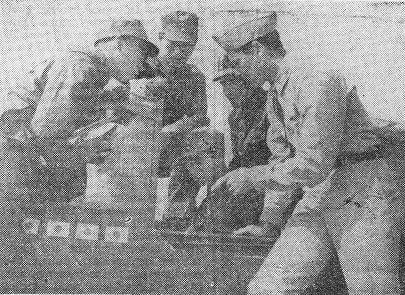 U.S.-trained Chinese pilots are now flying, wingtip to wingtip, with members of the 14th Air Force, operating out of China.
Lt. Col. Bruce Hollaway explains some of the intricacies of the P-40 instrument panel to several new additions to his unit.
U.S.-trained Chinese pilots are now flying, wingtip to wingtip, with members of the 14th Air Force, operating out of China.
Lt. Col. Bruce Hollaway explains some of the intricacies of the P-40 instrument panel to several new additions to his unit.
|
Veteran Jap Fighter En Route
To States To Visit Daughter
Lt. Col. William E. Bayse, executive officer for a medium bomb group, is all smiles for two good reasons. Firstly, he was awarded the Distinguished Flying Cross for participating in combat missions totaling over 200 hours in Java, India and China. "His leadership, combined with his coolness and courage," the citation said, "reflecting highest credit on the military forces of the United States." Secondly, he had orders in his pocket to return to the United States, where he will see for the first time, his 17-month-old daughter, Carol Francis.
Bayse, who also holds the Silver Star and Air Medal, fought nearly two months in Java before joining the first heavy bomb group to operate from India. Later he went to China with medium bombers and led raids on several important Jap-held cities.
He returned to India as executive officer Jan. 3 of this year.
"I've been shot up several times, but never shot down," he said.
Sussky Awarded DSC For Burma Rescue
Maj. Gen. Clayton L. Bissell, 10th Air Force commander, announced that the Distinguished Service Cross has been awarded Lt. Ira M. Sussky, of an Assam air base, for his heroic rescue of Lt. Melvin Kimball in Burma during the last week in March.
Kimball's P-40 contracted motor trouble and his plane was forced down near a Jap headquarters. Capt. Charles H. Colwell, coming home for a mission, saw the 14th Air Force pilot in distress, noted his position and flew back to his home base in Assam.
There, Sussky volunteered to rescue Kimball with the PT-17 trainer biplane, which had taken three other pilots out of the Naga jungles. He did so, while fellow P-40 pilots kept off Jap ground troops by strafing.
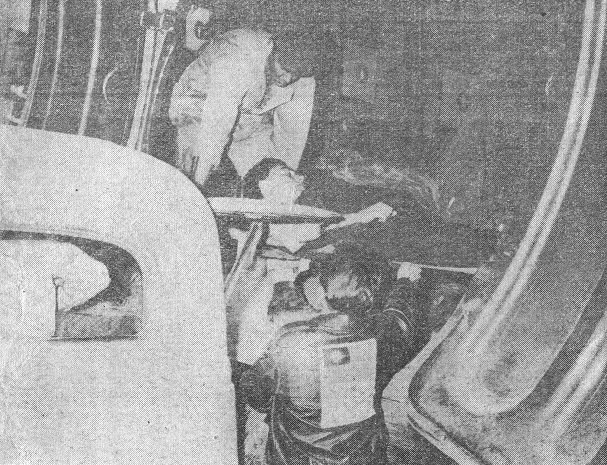 Malaria victim Sgt. Robert Vandre, of an Assam fighter squadron, is bundled aboard a C-47 and flown to a station hospital for treatment of the
sickness he incurred.
Malaria victim Sgt. Robert Vandre, of an Assam fighter squadron, is bundled aboard a C-47 and flown to a station hospital for treatment of the
sickness he incurred.
|
April Top Month
For 10th Air Force,
Claims Bissell
Maj. Gen. Clayton L. Bissell, 10th Air Force commander, looked up from a sheaf of statistics at his elbow, remarked pridefully:
"April was our most successful month."
He amplified the statement thusly for the roomful of reporters attending his weekly press conference:
Over 700 sorties were made against enemy objectives in Burma . . . Not a single 10th Air Force airplane was lost as a result of enemy action . . . Bombing accuracy was improved . . . Despite "increasingly difficult" weather, planes were able to operate all but five days . . . There wasn't a single enemy attack directed against India.
OVER ‘BUCK FEVER’
Bissell credited greater experience by pilots for the improvement in bombing accuracy. "They've gotten over their 'buck fever' stage," he said. This experience, plus added skill and confidence, also enabled them to increase their bomb loads to maximum poundage, the general remarked.
The fact that the Jap remained bedded down in his lair during the month except for defensive action disappointed U.S. fighter pilots, said the 10th Air Force chieftain, announcing: "The boys would have enjoyed a few scraps."
JAPS UNSUCCESSFUL
He revealed that nine B-24 and B-25 missions were intercepted by Jap fighter units ranging from one to 16 planes. All were successfully beaten off, with one Zero destroyed, another probably destroyed and six damaged.
Although not a plane was lost during April, Jap ground fire was reported heavier. Ack-ack reached its jagged fingers up better than 18,000 feet, but no material damage resulted.
Doc Leads By Nose In Race For Table
CHINA AIR BASE - The flight surgeon of this little hand-picked squadron was engrossed in operating upon the hand of a Chinese mechanic when an echelon of Jap planes came over.
Just then, anti-aircraft suddenly opened up and the doc thought the dispensary was being strafed.
It is a point of argument who got under the table first - the Chinese, the doc or his non-commissioned assistant. Rumor (well founded) is that the doc led by a nose.
After the air battle was over and the anti-aircraft ceased firing, the three crept out from under the table and the operation (amputation of a finger, caught in an automobile fan) was successfully concluded. - By 1st/Sgt. T. L. IRWIN.
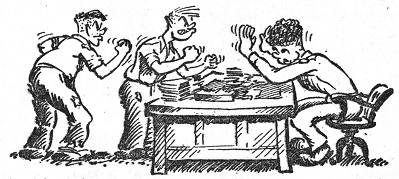 LETTER TO THE EDITOR --
LETTER TO THE EDITOR -- WRITTEN ON ASBESTOS
To the Roundup staff:
Sure, we're sweating out going home here in the jungles of Eastern India, where life is raw. We have an idea we've just about done our share in this war and quite a bit more. We're sore!
Why in hell didn't the dope who wrote the article entitled "So You Want To Go Home" try to muster up enough courage to at least sign his name? He is wearing a necktie and leading a soft, easy life in Delhi. He has good meals once in a while. He can get a drink once in a blue moon at least.
We're inviting him up here to see if he doesn't want to go home, too, after a couple of months of this life.
How about a little change in the tone of some of those articles? We want the Roundup to build up and keep up our morale - not to tear it down.
We can muster up enough courage to sign our names - here they are: T/5 Theodore Reel, T/4 Harold L. Anderson, T/5 Ivan Bennet, Cpl. Dean Calkins, T/5 Lloyd B. (unreadable), Pfc. Omer Singleton, T/5 Fred E. Briggs.
Roundup policy prohibits the use of by-lines for officers on the staff. We will deviate just this once, however, and admit that the "dope" who wrote the editorial in question was Maj. Fred Eldridge, who, incidentally, never wears a necktie. (Enthusiastically, Ye Ed.)
Rugged Jacks Assam Game
By Cpl. HENRY W. ASHER, JR.
ASSAM - On passing the "Play Room" a few days ago, we heard shouts of "They're mine, you dropped them," and "Aw, you only got up to twosy." On entering the Den of Forgotten Men, we discovered to our amazement Cpl. Petti, Sgts. Harper and Gilbert, T/5 Bromo Salvo DiSalvo and Kroll were engaged in that rough, rugged, tough and wicked game of - believe it or not, fellows - JACKS!
One of the few high sports in the drab existence of this unique Quartermaster and Ordnance combination is the daily "News Commentary" during the noon-day repast, given by Sgt. Joseph (Kaltenborn) Shedd. His coverage of world affairs is quaint in that he imparts news that all of us want to hear. He made history, recently, with one statement on the activities in Tunisia.
I quote, "British forces are advancing on all fronts. The last time they had seen Rommel he had his hat in his hand and was hauling a--" I unquote. This analysis is being sponsored by the mess men of the Ord and Q.M., Sgts. Houseal (Chief Mess), Gustafson (The Baker's Nightmare) and Cooks Wheatley, Wessel and McManes. Their reason, they say, is "We got to give the boys something to take their minds off our cooking." On that remark there is no debate.
|
REPETITION
INDIA AIR DEPOT - Last year while the S.S. Brazil was ploughing toward India jam-packed with U.S. troops, a chess tournament was held aboard among 18 officers. Winner was Lt. A. H. Leonard, Second, Lt. J. W. Johnson. Recently, a chess tournament was held here, with only three of the same contestants who participated in the S.S. Brazil tournament among the entries. Winner was Lt. A. H. Leonard, Second, Lt. J. W. Johnson. Both winner and runner-up are now first lieutenants. Gold bars gleamed from their shoulders on shipboard. Leonard has just left for China, looking for new fields to conquer. |
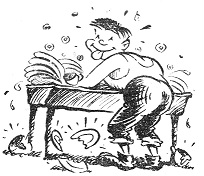 SABOTAGE
SABOTAGE
SOMEWHERE IN INDIA - Sabotage.
It all began with our purchase of porcelain cups and dishes and dismissal of Indian kaypees.
All went well for the first day or so, probably due to the novelty. But soon the privates found they were pulling kaypee once every three or four days. Simultaneously, the number of dishes and cups began a gradual - and convenient - descent. Until at a recent date, they numbered only 18 cups and 50 plates.
Accusations have been directed at the kaypees, notices have been posted, warnings made . . . but to no avail. The number of dishes and cups continues to decrease.
It looks as if G.I. mess kits are here to stay.
Today the privates are under a scrutinizing eye. The alleged ringleader denies all charges. He claims he has dropsy. By W. H. TALLEY.
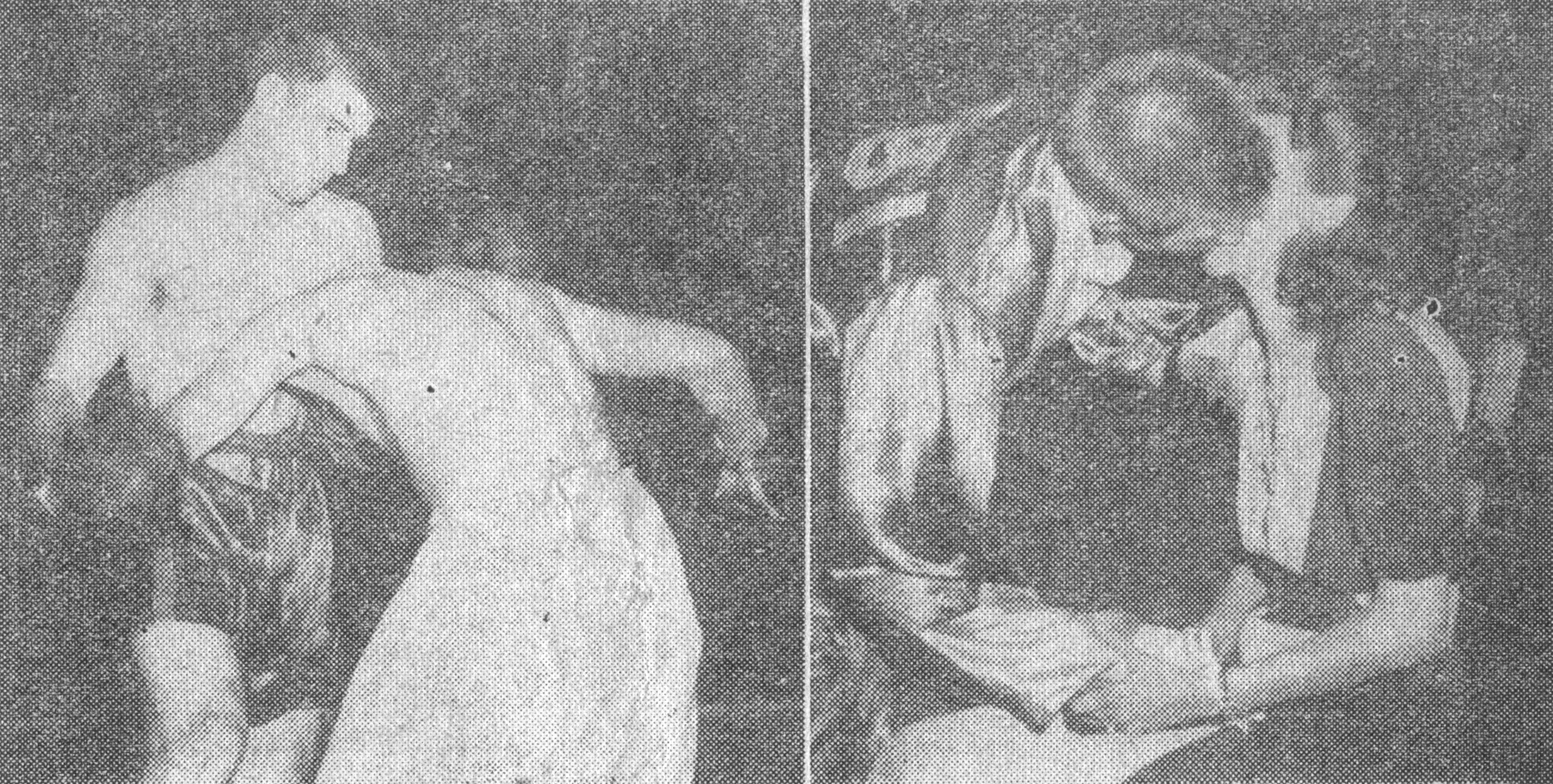 Cpl. Kelly Parafimick, who, like Maxie Rosenbloom and Ken Overlin, does much of his training on the dance floor, carried too many guns for Master
Farmer, who he knocked out in the second round. After the victory, Parafimick reaped his reward - a kiss from the girl friend. Three thousand boxing
fans attended the Irwin Stadium matches between the 10th Air Force HQ and British forces stationed in Delhi, won by the Americans, seven bouts to four,
mostly by knockouts.
Cpl. Kelly Parafimick, who, like Maxie Rosenbloom and Ken Overlin, does much of his training on the dance floor, carried too many guns for Master
Farmer, who he knocked out in the second round. After the victory, Parafimick reaped his reward - a kiss from the girl friend. Three thousand boxing
fans attended the Irwin Stadium matches between the 10th Air Force HQ and British forces stationed in Delhi, won by the Americans, seven bouts to four,
mostly by knockouts.
|
|
MYSTIC INDIA Cobra, lizard and deadly krites! Moon light and sun - and heat exhaustion, Walk at night with plenty of caution! Cool whispering breezes - and then the gale, With thunder, lightning, and plenty of hail! A gentle rain - and then all too soon, The endless, ceaseless, moldy monsoon! Weird music - and a jackal's howl, When he and the hyena go out to prowl! Flowing rivers - and contaminated well, Germs that make you sicker than....! Lovely butterflies - irritating ants, Especially those in the seat of your pants! Majestic buildings - and coolie's novel, Dirt you can't move without a steam shovel! Haunting perfumes - and nauseating stench, If you take a deep breath your stomach will wrench! How about the Jap and his bombs out of the blue, Hell, I forgot that he's here too! - By MARTHA J. WRATNEY Red Cross ALL IS WELL And ships out at sea can sail in the calm, And you and I, dear, can walk arm in arm. Darling, We'll know that all is well, all is well tonight. When free men can speak whatever they wish And Sundays are days for people to fish And you and I dear, can act devilish Darling, we'll know that all is well, all is well tonight. We won't have to seek a shelter To flee from the falling bombs No need to run helter-skelter There's comfort here in my arms When lights in the world shine ever so bright And millions of hearts feel ever so light And you and I, dear, can kiss nighty-night. Darling, we'll know that all is well, all is well tonight. - By Cpl. LEO LIEBMAN |

MON JOYEUX CAPITAINE (A Tribute to Capt. Burrall Barnum) Mourn not this man, this pilot dead Who flew, and for love of country bled For his is the all-inspiring sacrifice That Freedom must have when she beckons, to entice For men must fight to live or die This one is gone; he was quite a guy But there will be others to take his place For his spirit lives on to win the race. Who was this man who duelled in air? This one who never knew despair? This one who played for highest stake Who reckoned not with the Great Gambler's rake? He had a twinkle in his eye We never thought that he would die. A song was always in his heart A joke he was ever willing to start He would jest and joke, and rib a little, too He wanted everyone to enjoy himself, too. He loved humor, because it made things lighter And the road he is travelling is surely brighter. But we must forget, for we have a job to do But we are hoping and others are too That St. Peter will see him coming down the way, and grin And spread the Gates wide, with Angels humming, and say: "Come in, Mon Joyeux Capitaine." - By Sgt. CLYDE H. KETTERING |
|
QUESTION All laugh at play and go to bed. Unmindful of the angry bombers, Dropping death from overhead. But when at last the wars are done And peace across the earth is laid, In unfamiliar calm and silence Will they shrink and be afraid? - By Sgt. SMITH DAWLESS (And none of them are fun). But war is hell, and this is war And the job must still be done. We grouse and we gripe about it And cuss the unlucky day We ever joined an Army To be shipped to hell away But we'd go back and do it again Each and every mother's son - For the fact is plain, it still remains, The damned job must be done. So grin you son of a sea cook And act like it might be fun - And go back home and lie to the kids About the war their daddy won. - By Sgt. JOHN W. PARKER CROONERS When I maintain That crooners all Are just a pain. No sleep will I lose When sisters Andrews So over-rated Once and for all Are liquidated. - By ANONYMOUS SUFFERER |
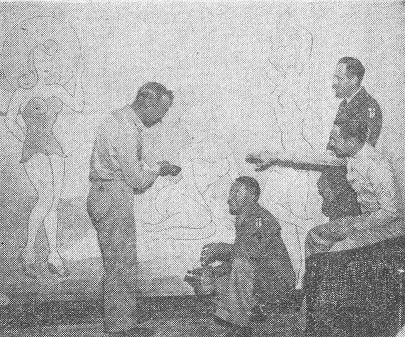 The committee responsible for the day room at an Assam base admires the wall decorations. Sgt. C. Cooper, left, puts finishing touches on the art.
The onlookers and consultants are, left to right, Sgt. Jack Price; T/Sgt. Shelby Scott, president of the project; and Sgt. James Teslik, business
manager.
The committee responsible for the day room at an Assam base admires the wall decorations. Sgt. C. Cooper, left, puts finishing touches on the art.
The onlookers and consultants are, left to right, Sgt. Jack Price; T/Sgt. Shelby Scott, president of the project; and Sgt. James Teslik, business
manager.
|
New Era For Bulltown Laddies;
Service Club Opening Planned
By Sgt. WALTER J. GRUENWALD
BULLTOWN - "Hey, Sad Sack, let's go over to the service club."
That old familiar cry of the barracks, after the evening chow back in the States, has long been foreign to the ears of a great many soldiers stationed here, but it won't be for long. No, siree, after much planning and determination the mayor of Bulltown finally dug his G.I. heels into the fertile land of India, and, with it, began a new era for Bulltown residents.
A drop of the hanky and hundreds of coolies swarmed to a pile of nice red bricks to start work. When the dust had cleared away, and before the sun could set on another month, there before your "sunglassed" eyes stood one of those remarkable Indian structures that will henceforth be known as the "place to go" after a hard day's work, to read, play games, listen to the radio or phonograph, have the usual "bull sessions" and a hamburger and soda. Perhaps when the wind blows in the right direction, with some women attached to it, or the WAACS drop some of their "home bred" beauties over here, we might have a dinner dance or two.
PLANS STARTED
With the buildings settling down to its foundation, and no mishaps as yet, the boys are now in the midst of plans for their "grand opening."
The Bull Sheet, Bulltown's own local newspaper, has started a search for an appropriate name for the new club. Not to be out done by "Duration Den" out Delhi way, or by any of the other places that have been springing up like mushrooms all over the Theatre, suggestions are rapidly pouring in to the special service office and the judges are slowly getting a headache.
For example, one G.I. suggests the "Hep Hole" as an offering, and ought to get a lot of backing from the "dig-dig" followers. Another one of our "fellow sufferers" submitted the "Wolves Den" for his contribution. Keeping in line with the local towns' name, one soldier offered for his bit, "Bull Pen." And to those such brain childs as the following: "G.I. Retreat," "Uncle Joe's Annex," "Monsoon Inn," "Cocoanut Grove," and "Goldbrick Gables."
FURNISHINGS GRAND
Now for furnishings. They are really something to look at and sigh. Not exactly the blue-leathered and chromium-plated affairs that adorn Radio City in all their glamor, but close to it - well, close enough. Upholstered easy chairs and divans and various other comforts are ready to be put in their proper places. Plus radios, phonographs and games.
Outside of the club, rambling walks have been laid, lines on either side with bricks. We had to have something to equal the famous "Flirtation Walk" of West Point as long as we're in the Army - even if we don't have anything to flirt with - or walk with.
Plans for the opening date call for the latter part of May. The program committee is working on the project and report it is well in hand. Due to the scarcity of spotlights - Grauman's Theater couldn't send any - we will have to be content with flashlights and candles.
|
G.I.’s Swap Grim Yarns On Battle Of Delhi
By Sgt. JACK BLUMENFELD
"I'm telling you fellows, I was a walking advertisement for the Roundup campaign against bedbugs." This was Cpl. Dave Pindyck, our legal turf adviser, sounding off at a barracks conclave. "Here I was in a local store buying something, when suddenly the proprietor pointed at my shirt and laughed out loud. Boy was I embarrassed. Strutting across my left pocket was a big red juicy bedbug. Ugh, it was awful. And I don't live at the Marina, either."
Here, Pvt. Bob (Drummer Boy) Leonard came to life. "What have you got to kick about, Jock?" he chided. "Just one measly little insect? Hell, I had thousands pestering me yesterday - thousands of ants, white one, red ones, big ones and little ones - all in one big moving, messy mass on my shelf. I guess that if that if that candy they were eating was poisoned I could have rid the world of ants for all time. But, dammit, it was that delicious box of Whitman's chocolates they were eating - the box I had bought at the PX just an hour before."
A low cackle of laughter escaped from Sgt. Bill Muenchow's lips at this point. "So you fellows think you have insect trouble," he chuckled. "Listen, did you hear about Sgt. Charles Davenport?" Again he laughed. "He suffers from termites. No kidding. Last night was the last straw - for the
 termites. They finally broke through the beams of his bed - and it collapsed. First Davie hit the floor. And then he hit the ceiling! He cussed till he
was dry of throat and of epithets. His trying to get out of bed was a riot. It was a sight seeing him getting up out of bed - literally. I've never seen
anyone blow his top like Davie did that night."
termites. They finally broke through the beams of his bed - and it collapsed. First Davie hit the floor. And then he hit the ceiling! He cussed till he
was dry of throat and of epithets. His trying to get out of bed was a riot. It was a sight seeing him getting up out of bed - literally. I've never seen
anyone blow his top like Davie did that night."
"Aw, go on," minimized S/Sgt. Bob Kessler, unimpressed. "Davie's tame compared to Pfc. Jack Webster. You should have seen that Alabama tornado blow off when he came back from a two-hour search for the Verbal Order File. Was he hot! I'll bet he's glad to see me going to China. For him there won't be any more running around for paper stretchers, striped paint and feathers for the machine-gun nest."
‘Teng How,’ Say G.I.’s Serving At China Base
By Lt. JAMES E. MAHER
CHINA AIR BASE - "Teng How!
In Chinese, that means "OK," "swell," "sharp," etc. At least that's what we've been told.
And that's what members of this heavy bomb group in China are saying these days when discussing their new country, their new hosts and practically everything else here.
These boys can cook to the satisfaction of Col. Eugene H. Beebe, group commander, down to the lowliest dogface.
Soup, chow and sweets served in shining dishes on a white tablecloth are enough to remind any boy of home, sweet home. And when you can get laundry and dry cleaning done the way that little place on Main Street used to do it, buddy, you've got something.
In fact, the whole setup makes a fellow feel like working and that's just what the boys are doing.
(Editor's note: You flabbergast us, chum.)
Needless to say, the combat crews are busy, as are the AM's. They've got a job to do and they're doing it in fine fashion. They know the chips are down.
POOR TYPEWRITER BOYS
But shed a tear for the boys who do their fighting with the typewriter. There just aren't enough of the word machines to go around and the lads are like lost souls . . . Plenty of work to do and nothing to do it with. However, where there's a will there's a way, and so a little night work, sometimes by the light of a candle, finds them keeping up with their reports, rosters, payrolls, etc.
And speaking of payrolls, a source of never-ending wonderment to the G.I.'s is the money situation. Its hard as H--- to get used to spending six dollars for a haircut, $25 for a scoop of ice cream and $50 for a ride in a ricksha.
Of course, it's Chinese money (CN), but the fellows can't help but feel like millionaires with $600 or $700 in their pockets, no matter what kind of money it is. And imagine the feeling you get when three deuces gets you a $1,000-pot.
SOFTBALL TOP SPORT
In addition to the above-mentioned indoor sport (there are a number of others along the same line, as you may have surmised), there are plenty of outdoor sports available . . . badminton, volleyball, etc., but chief among them is softball - the closest thing possible to the grand old American game of baseball.
The officers in Group Headquarters, led by such stars as Capt. Horace G. Foster, Capt. A. B. Dannel and Lt. James E. Maher, are setting a hot pace. And, of course, the master-minding of the manager, Maj. William S. Davis, isn't hurting them any.
Anyhow, today it's softball. Tomorrow it'll be a hard ball on some Jap base. And it won't be long until it'll be a 1,000-pound ball right smack on Tojo's ugly head.
That's the goal of this new bomb group, and then, buddy, it'll be "Teng Boo How!" to all the Nips, and, believe us, that means something very, very bad.
INTINERENT GROUND CREW BACK IN THEATRE
EAST INDIA AIR BASE - After reading Ernie Pyle's article - "From India to North Africa" (Roundup, April 22) - we fellows thought that perhaps your readers might enjoy a sequel to his story.
We are the ground crew which was the backbone of Capt. J. B. Holst's much-travelled B-17 squadron and we have returned to the C.B.I. Theatre, this time to keep B-24's flying.
Like unsung guards in football who pull out of the line to knock down would-be tacklers, so we mechanics, armorers, line chiefs, gas
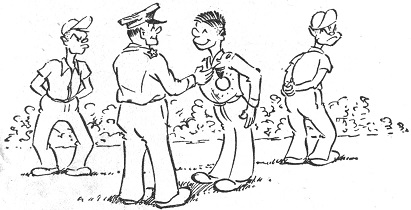 haulers, sheet and metal men, and the rest of us toil and sweat, cuss and storm, change the motors and patch the holes, make the numerous inspections
and perform the never-ending service to send "Betsy Lou," "Stink Fingers," or "68" on her next mission. The pilots and crews, like the backfield men,
win the glory in Life, Time, Newsweek and in Pyle's column.
haulers, sheet and metal men, and the rest of us toil and sweat, cuss and storm, change the motors and patch the holes, make the numerous inspections
and perform the never-ending service to send "Betsy Lou," "Stink Fingers," or "68" on her next mission. The pilots and crews, like the backfield men,
win the glory in Life, Time, Newsweek and in Pyle's column.
PUT TOGETHER FIRST P-40
In Australia, we put together the first P-40 we ever saw knocked down. Perhaps it was the first P-40 in Australia. We labored in three shifts during a 24-hour working day during Christmas and New Years Day just after Pearl Harbor to get all the dive bombers and P-40's to Java that ever did get there. We put together all the pursuit planes that were on the Langley when she was sunk off the coast of Java by the Nips. Fact is, we were in the same convoy on its way to Java to do the maintenance there so the pilots could fly their planes in combat.
In this land of mystery (India), the 10th Air Force was formed. Again, we battled weather and living conditions, now to get into shape the B-17's of which Pyle wrote so glowingly. Decorations were passed out to some of the men who flew to the Andaman Islands, but we, the crews which groomed the planes, never even received honorable mention.
A year ago, Rommel went on a rampage. All the planes for miles around were mustered to go to Egypt - planes that had worn-out engines that drank oil in gulps and quantities only comparable to the volume of bourbon we'll drink when we get back to the States.
CAME TO THE RESCUE
Who came to the rescue? Right, you guessed it. We grease monkeys, with little sleep, determination and a damn lot of guts, took the cylinders out of wrong-sized engines and put them in no-good engines that were sitting on the ground waiting to fly a bomber to Egypt. It's history, now, that they did get there and did a helluva job blasting the Axis. Half of us grabbed our hats and tool kits and went along; the other half remained here and sent planes forward as fast as possible.
Our reward was knowing that we were a vital factor in turning the tide, that the planes we sent into action dropped bombs upon German camps and target areas, that the Nazis' ultimate defeat was started 'way back when the engines were being prepared for the test block here in India.
WOULDN'T IT BE WONDERFUL?

The day of return came, and those of us who had left streamed back to India. Some of the combat crews remained and joined the 9th Air Force, some have gone home, but the majority returned to take up the unfinished business against the Jap. Us? We are now with a bomber group in eastern India and have been spread out thin so that we might teach new arrivals the tricks of "keeping 'em flying."
We've been away from the States for 18 months now. We've lived in India for over a year in tents, grass houses and stone huts, survived a food shortage, done without PX supplies for months at a time, beaten of mosquitos and whipped malaria, killed snakes and have just heard remotely via the grapevine of the "gravy train," sleeping in hotels and per diem.
Wouldn't it be wonderful to get home for a while?
Well, we can dream, can't we? - By CHARLES EARTZ
Contrary Top Sergeant Causes Furore Among Music Lovers
By CPL. LEE KRUSKA
EAST INDIA AIR BASE - Readers who regard the polls of Downbeat, the music magazine, as gospel truth have risen up in arms against 1st/Sgt. Joseph Meier (he of the peek-a-boo salute), after his recent derogatory statements concerning Duke Ellington, 1942's King of Swing according to the popular periodical. "The Duke? Why he went out with repeal," he scoffed one night, and then, to add insult to injury, added: "And whoever heard of Downbeat anyhow?" Intimate friends of the sergeant (who claims to be an avid reader of Variety), however, just sat back and smiled, for they are familiar with his inclination to be contrary in arguments ranging all the way from the proper way to salute to labor unions. "No matter what side you take, he'll argue the other if he thinks it will get your ire up," they inform.
Of all things! Sgt. Earl Tischendorf, one of the coolest little gunners to ever scramble inside a bomber, says he gets the hiccoughs every time he over-eats at Legal's "Corn Beef Emporium" . . .
BOOED OFF AIR
Sgt. Arnold Spielberg, who was once booed off the air when he had one of his classical recordings played over the outfit's public address system, is now giving classical music to members of the Non-Coms' club and making them like it. Explains Spielberg: "The speaker at the club is hooked up to our radio and there's no switch or control button, so they can't shut off the program at will. As a result I shoot all the classical stuff at them that I can."
What would you say if you were asked: "Who do you think looks sweeter in shorts - Alphonse D'Auria, the Brooklyn Adonis, or Maurice Gilman, the roly-poly tech-supply lad who still thinks he mystifies with his slight-of-hand card tricks? Don't answer that question if you think S/Sgt. Barney Lee should be included when he wears (which isn't often anymore) his knee-length "zoot suit" shorts which brought him so much razzing not long ago. . . There are a few members of this squadron who wouldn't trade places with either Cpl. Roy Wright or Pvt. Dave Brechner. Those "two lucky boys" were shipped recently to a G.I. rest camp in the cool Himalayas, where they will loaf thru the summer as M.P.'s. . . Profound observation of one of our better-known G.I.'s when he found out that so-and-so was up for sergeant: "Why he hasn't even got the right shaped head for it!"
ROONEY UNDERSTUDY
Sgt. Leo Levine, with that inimitable Bronx humor, delights in putting someone on the spot. Recently, while on leave in one of India's largest cities he told a night club proprietor that Cpl. Timmie Knight had been an understudy to Mickey Rooney, Hollywood actor (who apparently will make all future films from a wheel-chair or hospital cot). It took Knight a helluva long time to convince the proprietor that he wasn't Rooney's understudy - that he couldn't entertain, tap dance, play the piano, beat the drums or beat his gums in Rooney style.
Capt. Elias Livingston, squadron medic, is a skeptic, first class. After Prof. Haskmate, self-styled Indian Yogi magician, had amused spectators at a squadron show by chewing and eating with feigned relish such edibles as razor blades, glass and phonograph needles, the doctor invited him in for an examination. The professor smilingly obliged. After a brief mouth-prodding session, the captain returned, shaking his head. "His mouth wasn't cut in the slightest, but I still think there's a trick to it," he ventured. (Ahem, doc, don't you know that India is the land of mystery and mystics?).
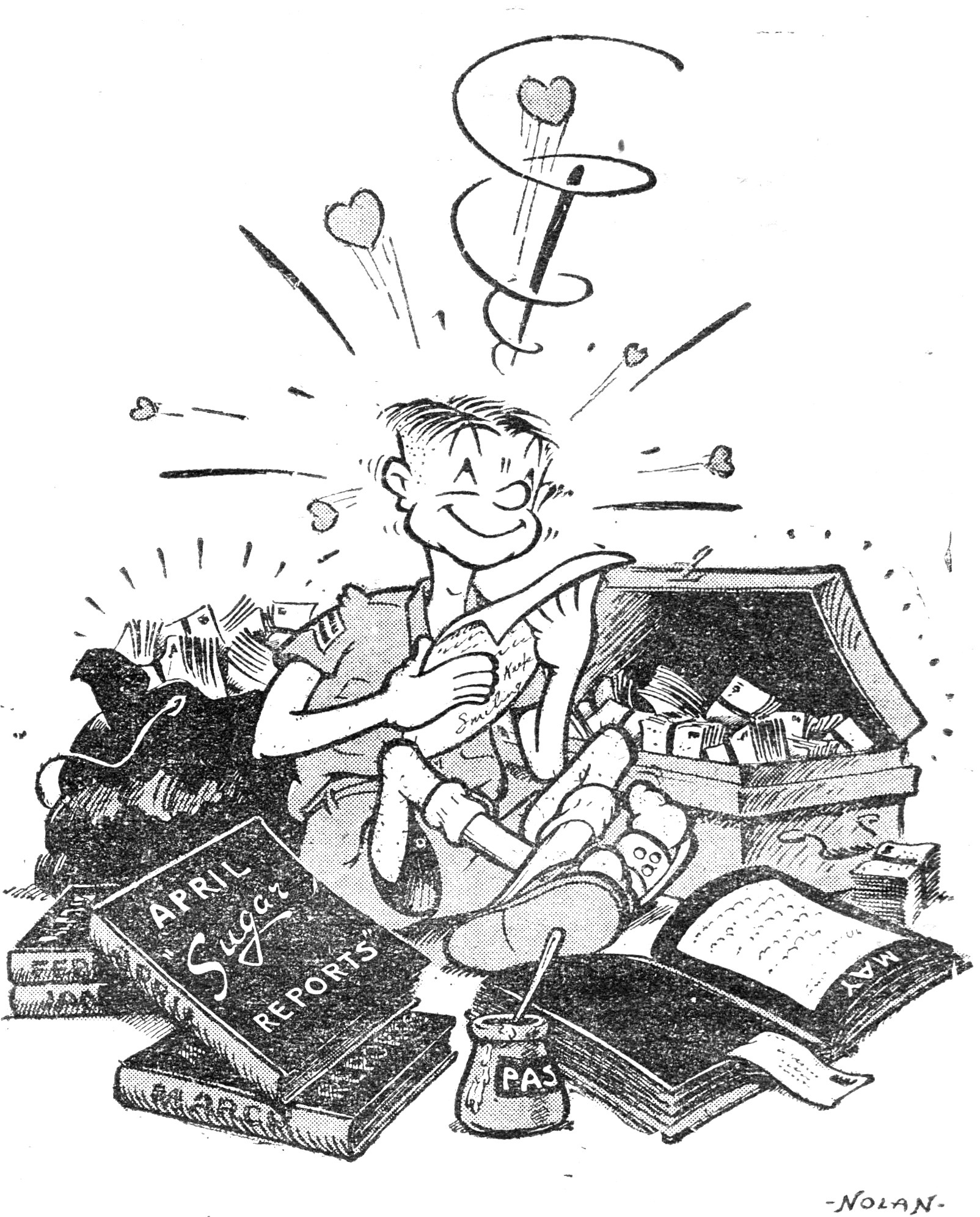
|
Comes now "Sugar Reports."
We learn that G.I.'s throughout the Theatre practice the age-old custom of saving love-letters. Some fill foot lockers to overflowing, others tie them up in bundles, some keep the hottest under their pillows, while others file them in albums which they call "Sugar Reports."
The gathering, processing, filing and general administration required by a large body of Romeos such as ours to handle such a flood of warm words daily poses a problem that requires immediate attention from the appropriate commanders.
Take the case of the field soldier who is suddenly called upon to don full field pack, rifle, ammunition and three days' rations and move forth against the enemy in the Burma jungle. If the soldier takes all his mail, he'll need a couple of coolies or else he'll have to leave a large part of his equipment behind. If he leaves his letters behind it will be like leaving a small section of his very soul and his morale will naturally be all shot to hell.
We know of a certain sergeant who writes glowing letters d'amour to five different girls. to each he protests his undying love and affection and to each he vows he is eternally faithful. We won't discuss what he does on the spot in India. Each of these girls writes him in turn at least twice a week. Although we don't read the letters we assume from the little wisps of smoke that eddy up from some that they don't quote any passages from Emily Post. This sergeant takes a great delight in these letters.
When gently chided about polygamous prose, the sergeant had a ready answer. Said he:
"It's like hedging a bet. They're all swell girls and if the draft dodgers at home get four of them I'll still have one left. Catch on?"
The case of this sergeant can be multiplied by the thousands in this Theatre and the ASF is already screaming about lack of storage space. What is to be done about these letters?
Should the mail sensors stop all letters from amorous soldiers to girls back home? The answer is "no" because a tidal wave of correspondence will inevitably come demanding to know why. "Dear Rollo" isn't writing his baby any more. Should the censors in the States stop letters from girl friends? We say don't stop them, friends, but read them all and then write a book after the war, because you'll pick up some of the damndest things you've ever seen. We could quote a few little gems, but our family journal must pass through the United States mails and there are laws about such matters.
The only answer to this problem that we can see is to follow the original Roundup suggestion of getting two, each, WAACS for each and every officer and man out here. The WAACS will be American, intrinsically lovely and strictly for us. Regulations concerning marriage within the Theatre should be eliminated with the arrival of the girls and no married WAACS should be sent over.
After being away from home this long, every soldier will undoubtedly marry one of the girls, set up housekeeping and stop writing and receiving letters. This would also serve a very useful purpose, for the billeting and mess officers who would be rid of a very thorny problem.
This thing is a little silly, but we're coming in late this week and with no particular ideas. Anyway, it fills a hole in the paper.
The C.B.I. Roundup is a weekly newspaper published by and for the men of the United States Army Forces in China, Burma, and India, from news and pictures supplied by staff members, soldier correspondents, the United Press and Office of War Information. The Roundup is published Thursday of each week and is printed by The Statesman in New Delhi, India. Editorial matter should be sent directly to Lt. Floyd Walter, Rear Echelon, Hq., U.S.A.F., C.B.I., New Delhi, and should arrive not later than Monday in order to make that week's issue. Pictures must arrive by Sunday and must be negatives or enlargements. Stories should contain full name and organization of sender.

MAY 13, 1943
Adapted from the original issue of C.B.I. Roundup
Copyright © 2015 Carl Warren Weidenburner
TOP OF PAGE PRINT THIS PAGE ABOUT THIS PAGE SEND COMMENTS
PREVIOUS ISSUE CLOSE THIS WINDOW NEXT ISSUE
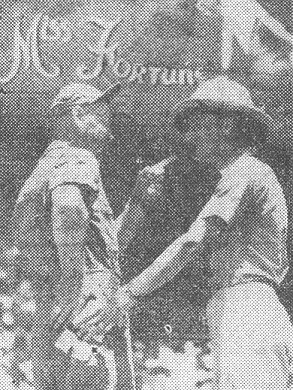 Smiling at misfortune are T/Sgt. Leon N. Weber and T/Sgt. Robert J. Stephens, who received injuries from ack-ack fire over Burma.
Stephens was nicked on the end of the schnozzola, as Weber points out.
Weber received his injuries in a more delicate part of his anatomy. (P.S. - He has trouble sitting down.)
Smiling at misfortune are T/Sgt. Leon N. Weber and T/Sgt. Robert J. Stephens, who received injuries from ack-ack fire over Burma.
Stephens was nicked on the end of the schnozzola, as Weber points out.
Weber received his injuries in a more delicate part of his anatomy. (P.S. - He has trouble sitting down.)
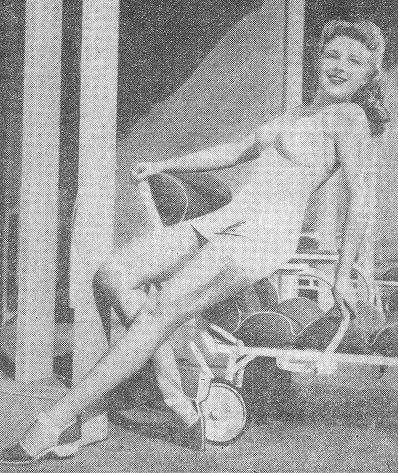 It's practically in-hooman to display this feminine charm on page one of this week's Roundup.
Slim - but with bumps in the right places - Evelyn Ankers, Universal Pictures actress, was recently named queen of "Swim for Health Week."
It's practically in-hooman to display this feminine charm on page one of this week's Roundup.
Slim - but with bumps in the right places - Evelyn Ankers, Universal Pictures actress, was recently named queen of "Swim for Health Week."
